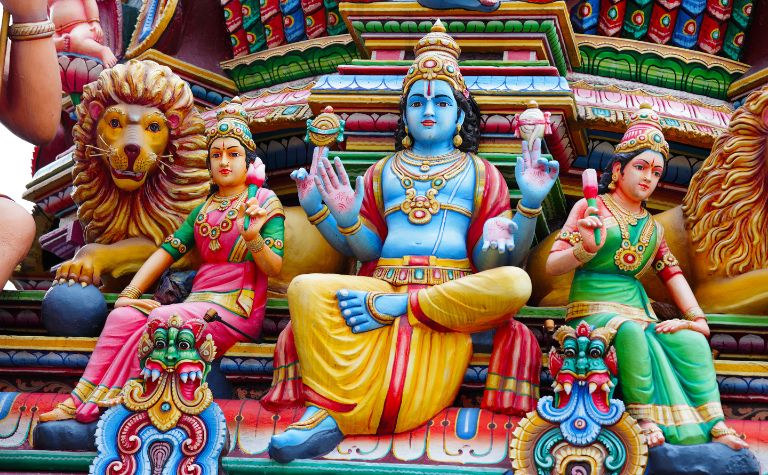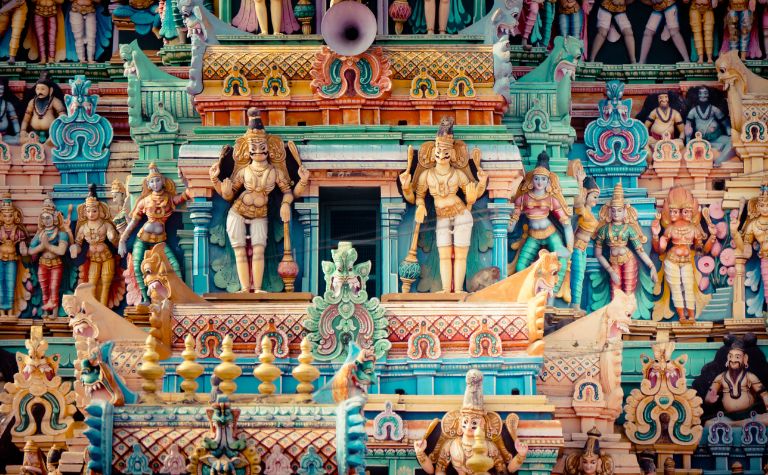Christianity and Hinduism, two of the world’s major religions, have rich tapestries of beliefs, values, and histories that have shaped the spiritual lives of billions.
Originating in different parts of the world, each tradition offers profound insights into the nature of existence, the divine, and the path to spiritual fulfillment.
This article explores the core tenets, historical milestones, and values of these faiths, offering readers a deeper understanding of their doctrines and practices.

Comparing Christianity and Hinduism: At a Glance
Are the Trinity in Christianity and polytheism in Hinduism the same? The Trinity in Christianity refers to one God in three persons: Father, Son, and Holy Spirit. Christians are devout monotheists.
Hinduism’s polytheistic beliefs involve multiple deities, each with distinct characteristics and narratives.
While the Trinity emphasizes one God in different persons, Hindu deities are diverse and numerous in representation and function.
| Aspect | Christianity | Hinduism |
|---|---|---|
| Name | Christianity | Hinduism |
| Size | Approximately 2.3 billion | Approximately 1.2 billion |
| Date Started | 1st Century AD | No specific start date; traditions date back over 4,000 years |
| Founder | Jesus Christ | No single founder |
| Key Beliefs | One God, Trinity, Salvation through Jesus Christ | Dharma (duty), Karma, Moksha (liberation), Reincarnation |
| Key Practices | Prayer, Eucharist, Baptism, Confession | Puja (rituals), Meditation, Yoga, Festivals |
| Divisions | Catholic, Protestant, Orthodox | Shaivism, Vaishnavism, Shaktism, Smartism |
| Central Location | No central location; Vatican for Catholics | India, particularly the Ganges river region |
| Sacred Texts | Bible | Vedas, Upanishads, Bhagavad Gita, Ramayana, Mahabharata |
Why doesn’t Hinduism have a founder?
Hinduism is a fusion of various cultural and spiritual traditions from ancient India.
Unlike religions centered around a single prophetic revelation, Hinduism evolved over millennia, making it diverse and without a singular founder.
Its beliefs and practices are rooted in ancient texts and traditions.
Christian prayer vs. Hindu meditation
In Christianity, prayer is a conversation with God, seeking guidance, giving thanks, or requesting help.
In Hinduism, meditation, often called “dhyana,” is a focused practice to attain self-realization and oneness with the divine, emphasizing inner peace and mindfulness over direct communication.

Christian and Hinduism Beliefs: Similarities and Differences
Christianity centers on one God and salvation through Jesus, emphasizing faith and original sin. The universe has a definite start and end.
Hinduism acknowledges multiple deities, viewing them as Brahman’s facets, and stresses karma, reincarnation, and moksha.
The universe undergoes endless creation cycles. Both offer distinct paths to spiritual fulfillment.
| Aspect | Christianity | Hinduism |
|---|---|---|
| God or gods | One God, existing in a Trinity (Father, Son, Holy Spirit) | Multiple deities, often seen as manifestations of a single ultimate reality (Brahman) |
| The Universe | Created by God; has a beginning and an end | Cyclical; universe goes through endless cycles of creation, preservation, and dissolution |
| Ultimate Reality | Ultimate reality is God, who is perfect, all-knowing, and omnipresent. God is personal and desires a relationship with humans. | Brahman (universal soul); the ultimate, unchanging reality amidst the world of change |
| Human Beings | Created in God’s image; inherently sinful due to original sin, yet capable of redemption | Atman (soul); intrinsically pure but covered by layers of karma and illusion (maya) |
| Problem with the World | Sin, which separates humans from God | Ignorance (avidya) of one’s true nature and accumulation of karma |
| The solution to the Problem | Salvation through faith in Jesus Christ and his atoning sacrifice | Liberation (moksha) through various paths like knowledge (jnana), devotion (bhakti), or disciplined action (karma) |
| The Afterlife | Heaven (eternal communion with God) or Hell (eternal separation from God) based on one’s choices in life | Reincarnation based on karma; cycle continues until moksha is achieved, then the soul merges with Brahman |
What is karma in Hinduism?
Karma in Hinduism refers to the law of cause and effect, where one’s actions, good or bad, determine their future experiences.
These actions influence one’s current life and subsequent rebirths. Leading a righteous life can lead to positive outcomes, while negative actions can result in challenges and suffering.
What is the atonement in Christianity?
Christians believe that Jesus Christ’s death on the cross served as a sacrificial atonement for humanity’s sins.
His sacrifice provides salvation and reconciliation with God for those who believe in Him.
Through His death, the debt of sin was paid, granting believers eternal life and forgiveness.

Heaven in Christianity vs. Reincarnation in Hinduism
In Christianity, death marks the transition to eternal life with God or separation from Him, based on faith in Christ.
In Hinduism, death is a part of the cycle of rebirth, with one’s karma determining the nature of their next life, ultimately aiming for liberation (moksha) from this cycle.
| Aspect | Christianity (Heaven) | Hinduism (Reincarnation) |
|---|---|---|
| Definition | Heaven is a paradise where believers in Christ reside with God after death or the final judgment. | Reincarnation is the cycle of birth, death, and rebirth of a soul. |
| Duration | Eternal | Cyclical, until one achieves moksha (liberation) from the cycle. |
| Based On | Faith in Jesus and righteousness. | Karma – the actions performed in past lives influencing future births. |
| Purpose | Reward for faith and good deeds, and to be in the presence of God. | Spiritual evolution through learning lessons across multiple lifetimes. |
| End Point | Heaven is a final resting place. | Moksha – liberation from the cycle and merger with the divine. |
In Christianity, salvation is the deliverance from sin and its consequences, achieved through faith in Jesus Christ.
In Hinduism, moksha is the liberation from the cycle of birth and death, reached through self-realization and union with the divine, ending the cycle of reincarnation.

10 of the Most Important Events in Christianity and Hinduism
Christianity emerged from Judaism in the 1st century AD.
Judaism, dating back to around 2000 BC with figures like Abraham, laid the foundation with scriptures, prophecies, and monotheistic beliefs.
Many Old Testament teachings and figures are integral to Christian beliefs, establishing a shared religious heritage.
| Christianity | Hinduism |
|---|---|
| 1. Birth of Jesus Christ (4-6 BC) | 1. Composition of the Rigveda (1500-1200 BC) |
| 2. Crucifixion and Resurrection (30-33 AD) | 2. Establishment of the Maurya Dynasty (800-500 BC) |
| 3. Council of Nicaea (325 AD) | 3. Life of Adi Shankaracharya (788-820 BC) |
| 4. Conversion of Emperor Constantine (300s) | 4. Composition of the Bhagavad Gita (500-200 BC) |
| 5. Great Schism (1054 AD) | 5. Construction of major temple complexes |
| 6. The Protestant Reformation (16th century) | 6. Islamic conquests and interactions |
| 7. The Council of Trent (1545-1563) | 7. Bhakti movement (7th-17th century) |
| 8. English Reformation (16th century) | 8. Spread and popularity of the Ramayana (19th century) |
| 9. Second Vatican Council (1962-1965) | 9. Colonization and its influence |
| 10. Growth of Evangelicalism | 10. Hindu renaissance in the 19th century |
The modern growth of Christianity and Hinduism
In the 20th century, Christianity saw significant expansion, especially in Africa and Latin America, driven by missionary efforts and social movements.
By the 21st century, it had become the world’s largest religion, adapting to modern challenges and diversifying into numerous denominations.
Meanwhile, Hinduism, largely concentrated in India and Nepal, experienced growth as India’s population rose.
Outside of the Indian subcontinent, the diaspora spread Hindu practices and traditions, especially in places like North America, the UK, and Australia.
While Christianity had more global dispersion, Hinduism reinforced its roots and expanded based on migration and global interest.
Also see: Religion Statistics by Country
Related Questions
Christianity and Islam are two of the world's largest religions, each with unique beliefs, practices, and traditions. Originating in the Middle East, they share some historical roots and monotheistic...
Exploring the world's religions using the comparison charts below offers fascinating insights into cultures and beliefs. It opens doors to understanding human history, values, and...
